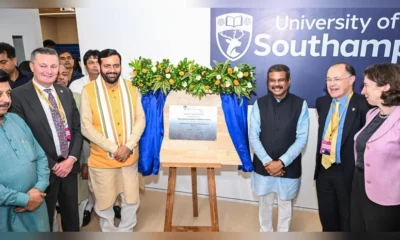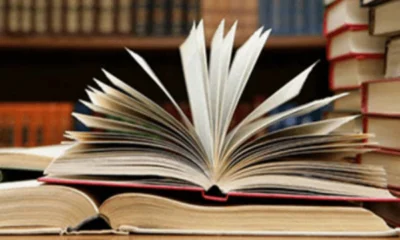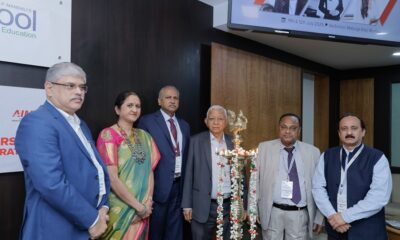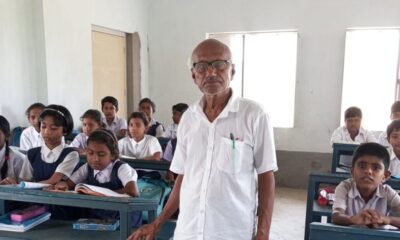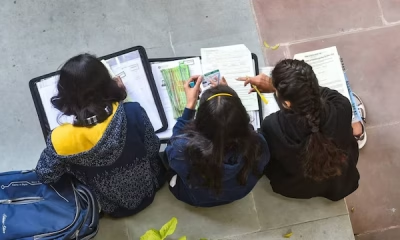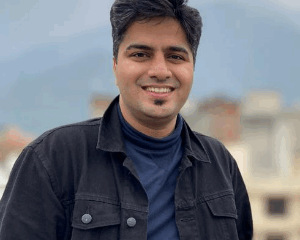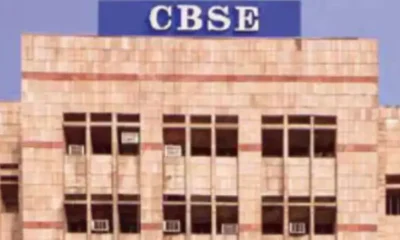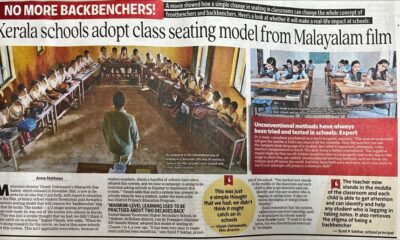News
Ministry of Human Resource Development making education Available, Accessible, Affordable and Accountable.
In pursuance to Hon’ble Prime Minister’s vision for ‘Transforming India’, Ministry of Human Resource Development took a leap forward in transforming education sector with the motto of “सबको शिक्षा, अच्छी शिक्षा ” (Education for All, Quality Education).
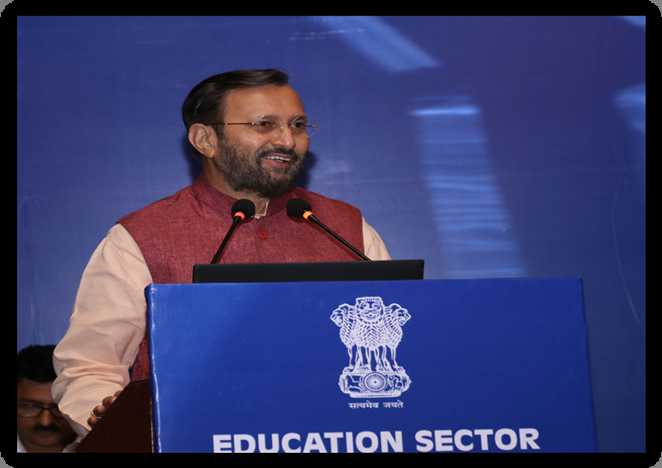
In pursuance to Hon'ble Prime Minister's vision for ‘Transforming India’, Ministry of Human Resource Development took a leap forward in transforming education sector with the motto of “सबको शिक्षा, अच्छी शिक्षा ” (Education for All, Quality Education).
Year 2017 has been a yet another landmark year in the field of education as 'Education For All & Quality Education' guided policy actions and decisions enabling transformation, that emphasized upon making education Available, Accessible, Affordable and Accountable.
Learning Outcomes
A frequent criticism against the RTE Act was that it did not adequately focus on issues promoting quality education in schools. Therefore, in a landmark step, the Rules to the RTE Act were amended in February 2017 to include, for the first time, the class wise, subject wise Learning Outcomes till Class VIII, thereby emphasizing the importance of quality education.
In this regard, Learning Outcomes for each class in Languages (Hindi, English and Urdu), Mathematics, Environmental Studies, Science and Social Science up to the elementary stage have been developed. These are the basic levels of learning that children should arrive at the end of each class.
Subsequently, 21 States and UTs, including Jammu and Kashmir, have incorporated the Learning Outcomes in their State Rules, while the remaining States have initiated the process, it is expected that this will be completed by the end of this year.
All the States and UTs have translated the Learning Outcomes document in their regional languages, and they are circulating these to all the teachers, and also providing them with the requisite training. Posters for display of Learning Outcomes on the schools along with leaflets on Learning Outcomes for reference of parents have been developed and circulated to all States and UTs. An amount of Rs. 91.20 crore has been released by the MHRD to all States and UTs for printing the Learning Outcomes documents, the Posters and the leaflets in regional languages, and for their distribution.
National Achievement Survey 2017-18
National Achievement Survey (NAS) which was earlier based on textbook content is now a competency based evaluation. As compared to only 4.43 lakh students who were earlier tested across Classes 3, 5 and 8, this time around 22 lakh students from around 1,10,000 schools across 700 districts of India (including rural and urban) were assessed in the year 2017-18 (November 13, 2017) making it one of the largest sample surveys of student learning achievement.
This survey is an improvement over the previous cycles of NAS as it will be completed in the one full academic year. It will reflect the scores of the students and will be able to suggest academic intervention in the same academic year. District wise Result will be generated within 2 months of test conduction. NAS Reporting will show if the students’ learning levels are as per the learning outcomes of a particular grade. It will also look for association of school, teacher and students’ background variables with students’ achievements while analysing the data.
Through NAS 2017-18, it will be for the first time that the teachers will have a tool to understand what exactly the child should be learning in various classes, how to teach this through activities and how to measure and ensure that children have reached the required level. This will also help agencies at the District, State, and National level to conduct achievement surveys and assess the health of the system to improve upon the policy directives. Adding to this, for the first time there will be detailed district-specific report cards for all the districts in the country.
Teacher Education
Major Reforms:
- Introduction of four year B.Ed. integrated programme with multiple pathways- with specialization for pre-primary, elementary, secondary and senior secondary teachers for enabling regulatory framework and orientation of all existing Teacher Education Institutions will be introduced from the academic session 2019-2020.
- Guideline on Strengthening of District Institutes of Education and Training (DIETs): As per the National Policy on Education (NPE), 1986, DIETs were envisaged for In-service as well as pre-service education. However, over the years, the focus had gradually shifted to pre-service education. Moreover, currently, there is no nodal agency with expertise in in-service training and thus to address this challenge, the Ministry of Human Resource Development has recently developed Guidelines on-strengthening of DIETs. Accordingly, States have been encouraged to do a district wise analysis before considering a reconceptualization of DIETs as per the models proposed in the MHRD Guideline on DIETs. This will also allow flexibility of getting more expertise into in-service teacher training.
- DIKSHA (Digital Infrastructure for Knowledge Sharing): DIKSHA was launched on 5th September, 2017 by the Hon’ble Vice President of India, Shri. M. Venkaiah Naidu.

DIKSHA will accelerate and amplify solutions, experiments and innovations that are underway, and is being attempted in the areas of teacher training and professional development. States and TEIs have the autonomy and choice to repurpose and extend DIKSHA to suit their own needs and purposes. DIKSHA is for the benefit of Teachers in Schools, Teacher Educators and Student Teachers in Teacher Education Institutes (TEIs).
- Amendment of the RTE Act for Training of In-service Untrained Teachers:
In another landmark achievement, the Amendment to the Section 23(2) of the RTE Act to extend the period for training of untrained in-service elementary teachers to 31st March, 2019 has been passed by both the houses of Parliament on 1st August, 2017. The same was notified in Gazette of India on 10th August, 2017. As per the above amendment all untrained in-service elementary teachers working in Government, Government aided, and Private unaided schools should acquire minimum qualification as laid down by an academic authority, authorized by the Central Government, by 31st March, 2019.
This would ensure an improvement in the overall quality of teachers and teaching processes, and consequently learning outcomes of children. Further, it reinforces the Government's emphasis on improvement of quality of elementary education.
The training for untrained teachers is being conducted through Online Mode by National Institute of Open Schooling (NIOS). The online D.El.Ed. Course has already been started from 3rd October, 2017. A unique feature of this initiative is that the study material for the course prepared by NIOS in self-instructional mode, is uploaded on the SWAYAM platform in four quadrants i.e. (1) Audio/Video lecture, (2) specially prepared reading material that can be downloaded/printed (3) self-assessment tests through tests and quizzes and (4) an online discussion forum for clearing the doubts. Three courses i.e., 501, 502 and 503 have already been uploaded on the SWAYAM Portal in 4 quadrants. The D.El.Ed. programme video lectures are also broadcast on SWAYAM PRABHA (DTH Channel no. 32).
A total of 14,02,962 in-service untrained teachers from Govt., Govt. Aided and Private Schools have registered on the NIOS portal and 13,58,000 admissions have been confirmed so far.
Distribution of tablets in Kendriya Vidyalayas
Kendriya Vidyalaya Sangathan has initiated a pilot project for connecting students and their teachers through tablets preloaded with relevant e content to facilitate easy classroom transaction, creation of genuine interest among students and effective learning of the students.
The students of class VIII in 25 Kendriya Vidyalayas (one KV from each Region) shall be provided with good quality Tablets on pilot basis. Every child shall be given a tablet with pre-loaded content in Maths & Science. About 5000 students and teachers shall be involved in this project. Along with the students, their teachers of Maths and Science also shall be provided with tablets for transacting the subjects.
Introduction of e-material/courses for Principals/HMs, teachers and students –
The Department is placing a lot of emphasis on the development and provision of e-content for students and also training of teachers, head masters and Principals.
The CIET-NCERT is developing e-materials and online courses for teachers and students. So far 4524 e-materials (audios, videos, interactives, images, documents, maps etc.) have been developed. They are regularly being validated and uploaded on the NROER portal and e-Pathshala portal.
NUEPA has established the National Centre for School Leadership (NCSL), which is conceptualizing and designing the Online Programme on School Leadership and Management using Moodle platform for School Heads. This e-learning course is envisioned as a Basic course and in the years to come NCSL would be designing Moderate and Advanced courses.
Two Days’ National Workshop – Chintan Shivir
This was organized by the Department of School Education and Literacy on 06-07 November, 2017. More than 350 participants from various NGOs, Private organizations, individual experts, State officials etc. participated.

Deliberations were on six themes – Digital Education for Students, Digital Education for Teachers, Value Education, Physical Education, Lifestyle Education and Experiential Education.
Presentations were made on these 6 themes to the Hon’ble Human Resource Development Minister by the participants. The recommendations are being reviewed and a detailed road map has also been prepared.
Ek Bharat Shresth Bharat – National Level Camp
A Social Science Exhibition cum National Integration Camp was organized by the Kendriya Vidyalaya Sangathan (KVS) at the Indira Gandhi National Centre for the Arts, New Delhi from 31st October to 2nd November, 2017, to celebrate Ek Bharat Shresth Bharat. A total number of 1250 students of Kendriya Vidyalayas participated in this National level camp from all the 25 regions.

Enhanced allocation of funds under SSA for components promoting quality education
The allocation of SSA funds to States and UTs was revised and in 2016, 10% of the funds were allocated for components related to entitlements and promoting quality education in schools. In 2017 this was enhanced to 30%. It is expected this will further increase to around 40% by April, 2018. This is a huge departure from previous years when the funds were left untied and were utilised by States and UTs primarily for civil works and paying teacher’s salaries.
Annual grading of all States and UTs based on their achievements under the SSA and specific decisions taken during reviews by Hon’ble PM
The SHAGUN portal was launched in January 2017 to enable real time monitoring of the SSA components and various decisions on elementary education taken during the reviews by Hon’ble Prime Minister. The Online Grading of States and UTs, which measures their performance, was introduced in September/October 2017, and it will be expanded and refined further so that it is a valuable tool enabling States and UTs to assess and improve their performance.
NCERT to distribute over 6 crore textbooks
NCERT launched a portal in August, 2017 to facilitate individuals, schools, States and UTs to directly purchase textbooks. By 11th December 2017, NCERT has received orders from 3524 schools for 1.56 crore copies through this portal. Apart from this NCERT has received direct orders from NVS and other states/UTs for about 1.55 crore copies. Thus, so far (by 11.12. 2017) NCERT has received orders for about 3.11 crore copies. It is expected that NCERT will be printing and distributing over 6 crore textbooks by June, 2018.

Textbooks will be distributed through four Regional Production-cum-Distribution Centres already established at Ahmedabad, Bengaluru, Guwahati and Kolkata apart from Delhi HQ. NCERT has also empanelled 905 vendors across the country for distribution of textbooks.
Awarding cleanest schools under Swachh Vidyalaya
During June 2016, DoSE&L launched the Swachh Vidyalaya Puraskar to recognize, inspire and celebrate excellence in sanitation & hygiene practice in Government Schools in the areas of water, sanitation, hand washing with soap, operations and maintenance, behavior change and capacity building.

A total of 2, 68,402 schools applied online through web portal/Mobile App for the Puraskar. The schools were selected at the district, state and national level. 643 schools were evaluated at the national level and National awards were given to 172 schools on 1st September 2017 including elementary and secondary schools in both urban and rural areas.
For 2018 the Puraskar has been extended to aided and private schools also and till 2nd week of November, 5.33 lakh Government, Aided and Private schools have submitted their applications for the Puraskar.
All schools to rollout the Automated Monitoring System at the school level under MDM
This department has put in place an automated system of data collection for real time monitoring of Mid Day Meal Scheme. Such data is being captured from schools with no cost to school Head Master/ Teacher.
Under the automated monitoring system, States/UTs have set up a suitable system of data collection (i.e. Interactive Voice Response System (IVRS)/SMS/Mobile Application/Web Application) from schools on a daily basis and using it for purpose of monitoring and timely follow up action.
All the States/UTs are pushing data on specific field in a predefined format on a real time basis to the Central Server maintained by NIC. Based on the data collected, various drill down reports are made available for real time monitoring of the scheme at National/State/District/Block level.
Improving universal access, gender parity and quality improvement in secondary education in 3479 Educationally Backward Blocks
An Innovation Fund has been set up under RMSA in order to encourage local innovative interventions for ensuring universal access, gender parity and quality improvement in secondary education in 3479 Educationally Backward Blocks. The fund is likely to be operationalised by December, 2017 and its impact should be visible by December, 2018.
So far, proposals from 23 States have been received under the project and a Video Conference with the concerned States/UTs Governments has been held under the Chairmanship of Secretary (SE&L) on 08.12.2017 in which the proposals have been considered.
Capturing Aadhaar based data of all 25 crore school students and creation of a Students Data Management and Information System (SDMIS) –
The Department is creating a database of all students in the country along with their Aadhaar details, which will help in reducing drop outs, duplicate enrolments, improve planning process and ensure efficient utilisation of resources.
Till date, data of nearly 21 crore students has been captured. By April, 2018, it is likely that the SDMIS will have captured data of all the 25 crore students, which will be updated on an annual basis thereafter.
Providing gender segregated toilets in all schools
The Prime Minister of India on 15th August 2014 announced that all government schools in the country should have toilets with separate toilets for girls within one year. The Department of School Education and Literacy launched “Swachh Bharat: Swachh Vidyalaya” campaign as a collaborative effort of the Central Government which provided funding through Centrally sponsored schemes of Sarva Shiksha Abhiyan, Rashtriya Madhyamik Shiksha Abhiyan, Swachh Bharat Kosh, and the States/Union Territories with Public Sector Undertakings and Private Corporates.
Under this initiative, 4, 17,796 toilets were constructed/made functional in 2, 61,400 schools in a period of one year up to 15th August 2015. With this, India achieved the target of providing 100% access to functional toilets in all government schools across the country.
The provision of toilet facilities in all schools has enhanced sanitation standards in schools leading to better health and hygiene among the children. ‘Swachh Vidyalaya’ was also recognized as one of the priority programmes for Prime Minister’s Excellence Award for 2016.
Scholarship:
- National Means-cum-Merit Scholarship Scheme (NMMSS)
- 3.80 lakh scholarships have been sanctioned for the last three years from 2014-15 to 2016-17.
- 3.59 lakh scholarships have been sanctioned for the current year 2017-18 as on 8.12.2017.
- National Scheme of Incentive to Girls for Secondary Scholarship (NSIGSE)
- 9.71 lakh incentive to girls have been sanctioned for the last three years from 2014-15 to 2016-17.
- 7.12 lakh incentives to girls have been sanctioned for the current year 2017-18 as on 8.12.2017.
Other achievements of the Department of SE&L
- A Bill for amending the no-detention provision under the RTE Act and allowing States to detain a student at Classes 5 and 8 has been introduced in the Lok Sabha.
- Board examinations made mandatory for 10th in all CBSE Schools.
- Mid Day Meal scheme offers food every day to 9.78 crore students in 11.40 lakh schools and 25.38 lakh cooks are employed in preparing it.
- 3 Crore illiterates became literate and passed the literacy test in adult literacy campaign.
- 93 Kendriya Vidyalayas (KVs) started during last 3 years and 19 KVs are to be started shortly.
- 62 new Navodaya Vidyalas sanctioned.
NEW EDUCATION POLICY (NEP)
In view of the vastly transformed landscape of education in India in terms of coverage, content and delivery systems, a New Education Policy is being formulated after nearly 30 years.
MHRD has embarked on an unprecedented collaborative, multi- stakeholder and multi-pronged consultation process. The consultative process has reached out to individuals across the country through more than 2.75 lakh direct consultations while also taking online inputs. The online consultation process was undertaken on www.MyGov.in portal from 26th January, 2015 to 31st October, 2015 and nearly 29000 suggestions were received on the 33 identified themes.
Over 200 thematic national workshops were held with a youth survey by the UNESCO Mahatma Gandhi Institute of Education for Peace, Sustainable Development. With regard to School Education, 1, 10,623 villages, 3250 Blocks, 725 Urban Local Bodies from 340 districts of 19 States have uploaded their Grassroots Consultation Reports on www.MyGov.in portal.
Similarly, 2741 Blocks, 962 Urban Local Bodies from 406 districts in 20 States have done the same with regard to Higher Education. A Committee for Evolution of the New Education Policy has been constituted to examine the outcome documents, recommendations & suggestions received and formulate a draft National Education Policy as well as a Framework for Action.
National Institutional Ranking Framework (NIRF)
It was launched on 29th September 2015, ranks institutions based on objective and verifiable criteria. It has been made available separately for Engineering, Management, Pharmaceutical, Architecture, Humanities, Law and for Universities.

The first ranks were declared on 4th April 2016. More than 3,500 institutions have participated in the exercise, making it the highest participated ranking exercise in the World. The second India Rankings were released in April 2017.
SWAYAM (Study Webs of Active Learning for Young Aspiring Minds)
The Ministry of HRD, has embarked on a major and new initiative called ‘Study Webs of Active Learning for Young Aspiring Minds’ (SWAYAM), which will provide one integrated platform and portal for online courses, using information and communication technology (ICT) and covering all higher education subjects and skill sector courses to ensure that every student in the country has access to the best quality higher education at affordable cost.
The SWAYAM IT platform is indigenously developed that facilitates hosting of courses, taught in classrooms from 9th class till post-graduation in a number of disciplines that can be accessed by anyone, anywhere at any time. The three cardinal principles of Education Policy viz., access, equity and quality shall be achieved by providing high quality e-content to all learners in the country through SWAYAM.
Courses delivered through SWAYAM are available free of cost to the learners and are delivered by best of the teaching fraternity. Hon’ble President of India had officially launched SWAYAM, on July 9th, 2017. At present about 750 MOOCs (Massive open online courses) courses are listed on SWAYAM and about 330 MOOCs are running, wherein about 6 Lakhs (5, 92,178) students have registered for these courses.

(On the auspicious occasion of “Guru Purnima” on 9th July, 2017, the Hon’ble President of India Shri Pranab Mukherjee launched the SWAYAM)
SWAYAM PRABHA
It is an initiative to provide 32 high quality educational channels through DTH (Direct to Home) across the length and breadth of the country on 24X7 basis. This would enable to deliver e-education in a most cost effective manner.
The Department of Space has allotted two Transponders of GSAT-15 for the same. The subscribers of free DTH service of Doordarshan (Free dish) would be able to view these Educational channels using the same set Top Box and TV. No additional investment would be required.
These educational programmes delivered over DTH shall also be made available at YouTube as archival data. The information related to channel schedules; subject, archival link etc are available on SWAYAM Prabha portal (https://swayamprabha.gov.in/) which is developed by INFLIBNET Gandhinagar.

(Launch Of “Swayam”, “Swayam Prabha DTH Channels” & “National Academic Depository” By Hon’ble President Of India During “National Convention On Digital Initiatives” organized By MHRD From 8th July to 10th July 2017 At Vigyan Bhavan, New Delhi).
National Academic Depository (NAD)
The Government of India is committed towards bringing administrative and academic reforms using technology for delivery of efficient services to all stakeholders. A step in this direction is the initiative of digital depository of academic awards known as National Academic Depository (NAD).
The NAD has been launched by Hon’ble President of India on 9th July, 2017. NAD is an online store house of academic awards (degrees, diplomas, certificates, mark-sheets etc) lodged by the academic institutions / school boards / eligibility assessment bodies in a digital format.
NAD is on 24X7 online mode for making available academic awards and help in validating their authenticity, their safe storage and easy retrieval. As on 24th November, 2017, 74.81 lakh records have been uploaded on the NAD Portal
National Digital Library (NDL)
Ministry of Human Resource Development (MHRD) is establishing the National Digital Library (NDL) under the National Mission on Education through Information and Communication Technology (NMEICT) with the objective to host a national repository of existing e-content available across educational institutions in the country and e-content developed under NMEICT. IIT Kharagpur has been entrusted to host, coordinate and set-up National Digital Library (NDL) of India towards building a national asset.
The objective of the project is to integrate all the existing digitized and digital contents across educational and cultural institutions/bodies to provide a single-window access to different groups of users ranging across the entire population.
NDL Portal (https: //ndl.iitkgp. ac.in) went live in February 2016 with users from selected CFTIs (Centrally Funded Technical Institutes), opened to all in February 2017 (with release of Mobile App), with daily website hits: ~30K. User base – Registered: 17+ Lakhs, Active: 7+ Lakhs, Content items, 72 Lakhs, Sources: 142 and IDR Sources: 85. Mobile App (Android): Launched in January, 2017, 3.5 Lakhs download and daily Android hits: ~20K. Training & awareness development IDR workshops: 19 and user workshops.
Higher Education Financing Agency (HEFA)
The Cabinet considered and approved the proposal of establishment of HEFA in its meeting dated 12th September 2016. In order to give a big push for building up robust higher educational institutions, the Cabinet has approved creation of the Higher Education Financing Agency (HEFA) with Government equity of Rs. 1,000 Cr.
The creation of HEFA will enable major investments for creation of high quality infrastructure in premier educational institutions. The HEFA would be formed as an SPV within a PSU Bank/Government-owned-NBFC (Promoter). It would leverage the equity to raise up to Rs. 20,000 Cr for funding projects for infrastructure and development of world class Labs in IITs/IIMs/NITs and such other institutions.
The HEFA would finance the academic and research infrastructure projects through a 10-yr loan. The principal portion of the loan will be repaid through the ‘internal accruals’ of the institutions. The Government would service the interest portion through the regular grant assistance.
All the Centrally Funded Higher Educational Institutions would be eligible for joining as members of the HEFA. For joining as members, the Institution should agree to escrow a specific amount from their internal accruals to HEFA for a period of 10 years. This secured future flows would be securitised by the HEFA for mobilising the funds from the market. Each member institution would be eligible for a credit limit as decided by HEFA based on the amount agreed to be escrowed from the internal accruals.
The HEFA would be jointly promoted by the identified Joint Promoter, Canara Bank and the Ministry of Human Resource Development (MHRD) with an authorized capital of Rs.2,000 crore. The Government equity would be Rs.1, 000 crore.
The HEFA would also mobilize CSR funds from PSUs/Corporates, which would in turn be released for promoting research and innovation in these institutions on grant basis.
Canara Bank was identified and appointed as Joint Venture partner on 29.12.2016 for establishment of Higher Education Financing Agency (HEFA) to manage the financing agency incorporated under the Companies Act, 2013 and also registered with RBI as NBFC. An MOU was signed on 9th February, 2017 between MHRD and Canara Bank for the same. Later, Joint Venture Agreement (JVA) was also signed between MHRD and Canara Bank on 16th March, 2017.
The investment in the equity of the JVC by MHRD, GOI and Canara Bank shall be in the following proportion:
|
S. No. |
Party |
Contribution (in Rs.) |
Shareholding Percentage |
|
1. |
GoI |
Rs. 1000,00,00,000/- |
90.91 |
|
2. |
Canara Bank |
Rs. 100,00,00,000/- |
9.09 |
HEFA has now been incorporated as Section 8 Company under the Companies Act, 2013 on 31.5.2017. The following subscription of equity has so far been made to HEFA by MHRD and Canara Bank:
|
Name of the Subscriber |
Amount (Rs. In Crores) |
|
GoI, MHRD, Department of Higher Education |
250 |
|
Canara Bank |
50 |
|
Total |
300 |
The first and second meeting of the Board of Directors of HEFA was held on 12-06-2017 and 11-8-2017 respectively. HEFA is now functional and institutes have accordingly been informed along with format of application to take the benefit of HEFA on 16 -8-2017.
The third meeting of the Board of Directors of HEFA was held on 29-11-2017 in which following loan applications to HEFA were considered:
|
S. No. |
Name of the Institution |
Proposed Loan amount (Rs. in Crore) |
|
1 |
IIT – Kanpur |
391 |
|
2 |
IIT – Delhi |
200 |
|
3 |
IIT – Kharagpur |
500 |
|
4 |
IIT- Madras |
300 |
|
5 |
IIT- Bombay |
521 |
|
6 |
NIT – Surathkal |
80 |
|
|
Total |
1992 |
INDIA SURVEY ON HIGHER EDUCATION
All India Survey on Higher Education (AISHE) was initiated in 2011 in which data for the year 2010-11 were collected. The survey was utmost necessary as none of the sources of data on Higher education gave a complete picture of higher education in the country. Also, there were many important parameters on which data were required for policy making but either no data was available or incomplete data was available.
For the first time all the major Stakeholders in Higher Education such as Medical Council of India, University Grants Commissions, All India Council for Technical Education as well as State Governments have participated in for the data collection exercise. The entire survey was conducted through electronic mode and a dedicated portal www.aishe.gov.in was developed for this purpose, thus making the exercise completely paperless.
The survey covers all the Institutions in the country engaged in imparting higher education. Data are being collected on several parameters such as teachers, student enrolment, programmes, examination results, education finance, infrastructure etc. Indicators of education development such as Institution Density, Gross Enrolment Ratio, Pupil-teacher ratio, Gender Parity Index etc. are calculated from the data collected through AISHE. These are useful in making informed policy decisions and research for development of education sector.
During AISHE 2016-17, 96.6% University, 92.1% Colleges and 72.4% Stand-Alone Institutions uploaded the data on the portal. Final report for the AISHE 2010-11 to 2015-16 are available on MHRD website. Survey for the year 2016-17 has been completed & Survey for the year 2017-18 will soon be launched.
SWACHHTA PAKHWADA
An exercise called ‘Swachhta Rankings” of Higher Educational Institutions were held on 14th September 2017. More than 3000 institutions participated in the online submission of their levels of campus cleanliness based on some key parameters like toilet adequacy, water purity & supply, hostel kitchen facilities & cleanliness, campus greenery, method of waste disposal, garbage cleaning systems etc. The best institutions in 5 categories were awarded.

To coincide with the Swachhta Pakhwada of the Department, under the Unnat Bharat Abhiyan programme, District Collectors were asked to complete Open defecation free (ODF) with facility for solid and liquid waste management in at least 1 village adopted by the educational institution in their district. 5 Collectors of Ajmer, Warangal, Telangana, Jhabua & Indore were the top 5 Collectors who completed the task in time and were awarded at the function on 14th September 2017. More than 1400 families in the villages benefited from this campaign.
RESEARCH PARKS
Five new Research Parks at IIT Delhi, IIT Guwahati, IIT Kanpur, IIT Hyderabad, and IISc Bangalore at a total cost of Rs.75.00 crore each have been approved by the Government. Approval has also been accorded for continuation of two already approved Research Parks at IIT Bombay and IIT Kharagpur at a cost of Rs.100 crore each.
The Research Park at IIT Gandhinagar at a total cost of Rs.90 crore is being funded by the Department of Science & Technology
IMPRINT INDIA
IMPRINT India is an effort to direct research in the premier institutions into areas of social relevance. Under this, 10 domains have been identified which could substantially impact the living standards of the rural areas: (1) health care technology, (2) energy security, (3) rural urban housing design, (4) Nano technology, (5) water/river system, (6) advanced materials, (7) computer science and ICT, (8) manufacturing technology, (9) advanced security and (10) environment/climate change. Each of these domains is coordinated by one IIT.
More than 2,600 research proposals have been submitted by scientists in the priority areas of these domains. These have been examined by eminent scientists and 259 proposals for Rs. 595.89 crore have been approved for implementation. 142 research projects costing Rs. 323.17 crore with joint funding by MHRD and various participating Ministries / departments are currently under execution under IMPRINT – I. IMPRINT-II is under process for approval.
UCHCHTAR AAVISHKAR ABHIYAAN
The scheme was launched to promote industry-specific need-based research so as to keep up the competitiveness of the Indian industry in the global market. All the IITs have been encouraged to work with the industry to identify areas where innovation is required and come up with solutions that could be brought up to the commercialization level.
Under the UAY, it is proposed to invest Rs. 250 crores every year on identified projects proposed by IITs, provided the Industry contributes 25% of the project cost. For the year 2016-17, (92) projects for Rs. 285.15 crore have been approved for implementation.
IIT Madras is the National Coordinator of the scheme. (160) proposals have been received of which industry has agreed to contribute Rs. 156 Cr, making this one of the biggest ever industry-academia partnership. These research projects are expected to result in registration of patents.
Other Initiatives
- Improving Gender Balance in IITs: For improving Gender Balance in IITs, the IIT Council in its 51st meeting held on 28.04.2017, on the basis of the recommendations of a JAB Sub Committee, and decided to increase female enrolment in B.Tech. programmes of IITs from the current 8% to 14% in 2018-19, 17% in 2019-20 and 20% in 2020-21 by creating supernumerary seats.
- Premier Testing Facility: The Union Cabinet in its meeting held on 10.11.2017 approved creation of the National Testing Agency (NTA) as an autonomous and self-sustained premier testing organization to conduct all entrance examinations for higher education institutions in the country.
- Several welfare measures viz. Anti-Ragging Cell, Anti-discrimination Cell, Gender Sensitization Cell, Internal Complaints Committee for prevention of Sexual Harassment & Barrier Free access for specially abled students in all places have been introduced.
- Six new IITs at Jammu, Bhilai, Goa, Dharwad, Tirupati and Palakkad were established and operationalized at a total cost of Rs.1411 crore.
- The proposal for construction of permanent campuses of these IITs was approved by the Union Cabinet in November, 2017 at a total cost of Rs.7002.42 crore for Phase-A.
- Global Initiative for Academics Network (GIAN): The GIAN programme brings together foreign and Indian faculties to teach an academic course that provides the credit to participating students selected from the world’s leading academic institutions. Under this Scheme, foreign schemes are coming and conducting courses, out of which 802 courses have been completed. In 2017-18, a total of 156 courses have been conducted till now.
- Smart India Hackathon 2017: First time India organized Smart India Hackathon 2017 with participation of more than 42,000 engineering students working on 600 problem statement to all digital solutions from 30 ministries. Second Smart India Hackathon 2018 has been announced and about one lakh engineering students are expected to participate.
- Wi-Fi under implementation in 38 Central Universities.
- University Grants Commission (Open and Distance Learning) Regulations, 2017 have been recently notified in the month of June, 2017 keeping in view the urgent need of appropriate regulations for monitoring of higher education through the open and distance mode. The open and distance learning system in India has emerged as an important mode for providing education to diverse sections of society. These regulations provide clear directions and instructions for HEIs proposing to offer UG and PG courses through the ODL mode, along with the mechanism of approvals, assessment and monitoring.
- UGC (Institutions of Eminence Deemed to be Universities) Regulations, 2017 have been notified to create a distinct category of Deemed to be Universities, called Institutions of Eminence Deemed to be Universities, which would be regulated differently from other Deemed to be Universities so as to evolve into Institutions of world class in reasonable time period. Also, in order to assist Indian Higher Education Institutions to get a rank within the top 100 in globally renowned rankings, UGC has invited applications under the Institutions of eminence schemewherein 10 institutions from the government and 10 institutions from the private sector are to be selected. Government Institutions will get financial assistance of 1000 crores over a period of five years in addition to the grant already being received. The institutions selected from the private sector will have complete autonomy to promote innovation and creativity expected to result in producing competent graduates for the development of the country.
Major Legislative Reforms
- IIT Public Private Partnership Bill – Lok Sabha passed the Indian Institute of Information Technology Public Private Partnership Bill 2017, on 26th July 2017, that seeks to allow 15 IIITs established on a PPP model to grant degrees
- The IIIT Bill 2014 was notified in the Gazette on 05.01.2015. The Bill which was approved by the Cabinet in August, 2012 and introduced during the Budget Session had lapsed with the dissolution of the Lok Sabha. The Bill, provides independent statutory status to the four existing IIITs in Allahabad, Gwalior, Jabalpur and Kancheepuram, which are funded by the Central Government, as also to declare them to be institutions of National Importance.
- National Institutional Ranking Framework (NIRF) which was launched on 29th September 2015, ranks institutions based on objective and verifiable criteria. It has been made available separately for Engineering, Management, Pharmaceutical, Architecture, Humanities, Law and for Universities as a whole. The first ranks were declared on 4th April 2016. More than 3,500 institutions have participated in the exercise, making it the highest participated ranking exercise in the World. The second India Rankings were released in April 2017.
- Passing of IIM Bill, 2017 by Lok Sabha Indian Institutes of Management are the country’s premier institutions imparting best quality education in management on globally benchmarked processes of education and training in management. IIMs are recognized as world-class management Institutions and Centers of Excellence and have brought laurels to the country. All IIMs are separate autonomous bodies registered under the Societies Act.
Being societies, IIMs are not authorized to award degrees and, hence, they have been awarding Post Graduate Diploma and Fellow Programme in Management. While these awards are treated as equivalent to MBAs and Ph.D, respectively, the equivalence is not universally acceptable, especially for the Fellow Programme. Therefore, after approval of the Cabinet, IIM Bill, 2017 was introduced in the Lok Sabha, under which the IIMs would be declared as Institutions of National Importance and which will enable them to grant degrees to their students. Bill has been passed in both the Houses of Parliament.
Salient Features of IIM Bill
Apart from authority to grant degrees, the Bill provides for complete autonomy to the Institutions, combined with adequate accountability. Management of these Institutions would be Board driven, with the Chairperson and Director of an Institution to be selected by the Board. A greater participation of experts and alumni in the Board is another of the important features in the Bill. Provision has also been made for presence of women and members from Scheduled Castes/Tribes in the Board. The Bill also provides for periodic review of the performance of Institutions by independent agencies, and placing the results of the same on public domain. The Annual Report of the Institutions will be placed in the Parliament and CAG will be auditing their accounts. There is also a provision of a Coordination Forum of IIMs, chaired by an eminent person, as an advisory body.
Important Achievements of NCERT
![]()
- Inclusive Education: The Council has developed the Tactile Map Book in Geography for students with visual impairments, Barkha Reading Series for All consisting of 40 booklets with additional features to aid early reading in inclusive settings has been developed in print and digital forms.
- Performance Indicators: NCERT has developed a Framework for Performance Indicators (PINDICS) for elementary school teachers and shared with States/UTs. NCERT has made PINDICs on-line.
- Rashtriya Avishkar Abhiyan (RAA): NCERT has developed Guidelines for the creation of State Resource Group for RAA. This has been shared with the states/UTs.
- Textual Material on Yoga: The Textual Materials on Yoga for students of Upper Primary and Secondary stages in English, Hindi and Urdu have been developed by NCERT.
- Veer Gatha: NCERT has developed “Veer Gatha” highlighting the sacrifices and patriotism of the war heroes of the country.
- NCERT has brought out publications on Sanitation, Cleanliness, Hygiene and Environmental Protection for students and teachers.
- North East India-People, History and Culture- a publication has been brought out by the NCERT.
- Publication and Dissemination Textbooks- More than 4.25 million copies of various NCERT publications in English, Hindi and Urdu have been brought out.
- Vocational Education: Under NSQF, the NCERT has developed students’ workbooks and modules for various job roles in different sectors such as Construction, Organic farming, Floriculturist, Micro Irrigation, Junior Software Developer, Marketing and Sales Management, etc. The NCERT is also in the process of developing curricula and student’ workbooks for another 100 job roles.
- Contribution in Pre-service Teacher Education: NCERT’s innovative and integrated pre-service teacher education courses i.e., B.Sc. B.Ed. (four year), B.A. B.Ed.(four year) and B.Ed. (two year) have now been replicated across the country since 2015.
- NCERT has conducted Yoga Olympiad and also National Role Play, Folk Dance Competition and Youth Festival for promoting health, yoga and life skills. In these programmes students and teachers from most of the states/UTs took part.
- The Council organized 44th Jawaharlal Nehru National Science, Mathematics and Environment Exhibition (JNNSMEE) at Bhopal from 10 to 16 November 2017.
- Kala Utsav: It is being organized in January, 2018 at Bhopal
Specific Targets to be achieved period up to March 2018
- Implementation of learning outcomes across the States/UTs.
- Development of e-content and digital books in all the subject areas for all the classes.
- Conducting school achievement survey for class X.
- Conducting researches related to school education and teacher education.
- Offering pre-service teacher education programmes in all regions.
- Organising need based in-service teacher professional development programmes in different subject areas across the country.
- Organization of Audio-video Festival and ICT Mela.
- Establishment of a Centre for Popularisation of Science.
- Enhancing International Educational Cooperation.
- Organising activities for promoting innovative practices.
- Organising National Outreach Programme Workshop on Practices of Inclusion.
Initiatives taken by Kendriya Vidyalaya Sangathan

- Union HRD Minister launches Swasth Bachche-Swasth Bharat Programme of KVS – Union Minister for HRD, Prakash Javadekar inaugurated the “Swasth Bachche Swasth Bharat” programme of Kendriya Vidyalaya Sangathan at KV NAD, Aluva (Kochi) on 21st August 2017. The Minister unveiled the Physical Health and Fitness Profile card for more than 12 lakh students of KVS. The KVS had already done a pilot in Patna and Chandigarh Region during the academic year 2016-17. Looking at the positive results on health and fitness of School going children, the KVS decided to implement it in all the KVs of the country. Activities under this ambitious programme are selected to measure various components of physical fitness of all the students in the age group of 5 to 8 years and 9 to 19 Years. Balanced emphasis is laid down on- Diet, Personal Hygiene and Clean Environment, Suggested Daily Routine and Yoga for Peace & Harmony.

- Sh. Prakash Javadekar laid foundation stone of K.V. Shahdara – Hon’ble HRD Minister Sh. Prakash Javadekar laid the foundation stone of Kendriya Vidyalaya, GT Road Shahdara in North East Delhi on 23rd February 2017. This is the first K.V. in this area. Hon’ble Minister formally laid the foundation of the school and unveiled the plaque before the huge gathering. Hon’ble M.P. of North East Delhi Sh. Manoj Tiwari, Commissioner, K.V.S. Sh. Santosh Kumar Mall were the guests of honour on this occasion. KVS Additional Commissioner (Admin) Sh. G.K. Srivastava and Additional Commissioner (Acad) Sh. U.N. Khaware were present as the special guests on the dais.

Education
University of Southampton Opens First Full-Fledged Foreign University Campus in India
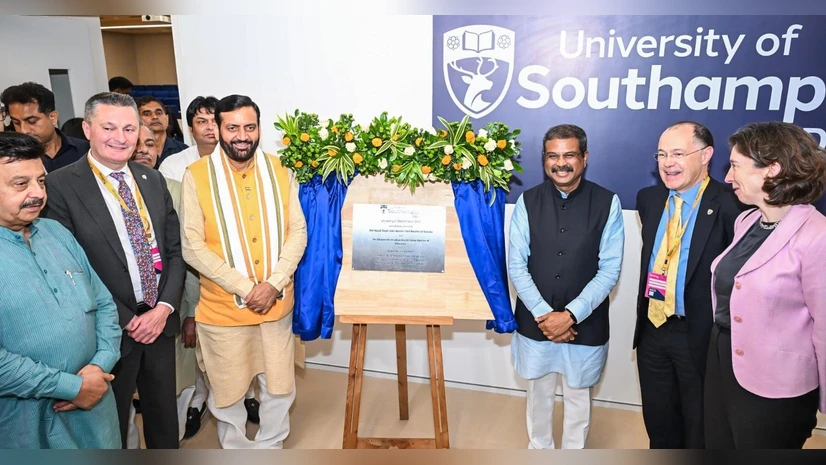
The University of Southampton has launched its fully operational campus in Gurugram, becoming the first foreign university to do so under the University Grants Commission’s (UGC) regulations.
The UK-based institution received its Letter of Intent last year and completed the campus within 12 months. Union Education Minister Dharmendra Pradhan and Haryana Chief Minister Nayab Singh Saini inaugurated the campus on Wednesday, calling it a milestone for NEP 2020 and the India-UK Roadmap 2030.
“This sets a precedent for internationalisation at home and for India’s vision of becoming a global knowledge hub,” Pradhan said.
Beginning in 2025, the campus will offer UK-aligned undergraduate and postgraduate programmes, including BSc degrees in Computer Science, Economics, Business Management, and Accounting & Finance, as well as MSc degrees in Finance and International Management. Students will also have the option to study up to one year at Southampton’s UK or Malaysia campuses.
Pradhan urged the university to introduce strong STEM offerings and focus on global challenges. Haryana CM Saini welcomed the initiative as a boost to Gurugram’s emergence as an education and innovation hub.
The university will recruit 75+ faculty members with international credentials. The inaugural student cohort includes candidates from India, the UAE, and Nepal.
Higher Education Secretary Vineet Joshi added that the UGC’s streamlined guidelines are enabling more such collaborations, helping position India as an attractive destination for international education.
The University of Southampton is a Russell Group institution and ranks among the top 100 universities worldwide. Its Gurugram campus is expected to strengthen India’s global academic ties and offer students a world-class, locally accessible education.
Education
NCERT’s New Class 8 History Textbook Addresses “Darker Periods”, Highlights Religious Intolerance and Resilience
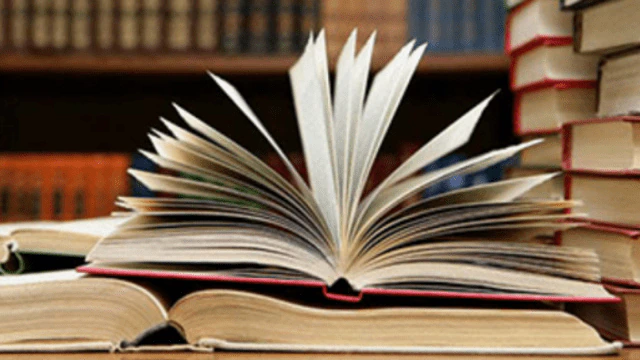
The National Council of Educational Research and Training (NCERT) has released the new Class 8 Social Science textbook Exploring Society: India and Beyond for the 2025–26 academic session, marking the first time students are introduced to the Delhi Sultanate and the Mughal Empire at this grade level under the revised National Curriculum Framework for School Education (NCF-SE) 2023.
This new volume, aligned with the National Education Policy (NEP) 2020, takes a more direct approach in describing episodes of violence, religious conflict, and iconoclasm during the 13th to 17th centuries, while simultaneously including cautionary notes emphasizing historical context and contemporary responsibility.
A Shift in Framing Historical Conflict
In a departure from previous editions, the book explicitly refers to political instability, destruction of religious sites, and forced conversions during the Delhi Sultanate and Mughal rule. It discusses multiple invasions, plunder campaigns, and attacks on temples by rulers and generals such as Malik Kafur and Alauddin Khilji.
A newly added explanatory section, titled “A Note on Some Darker Periods in History,” outlines the rationale for such inclusions, stating the intent is to understand historical violence dispassionately and not attribute blame to present-day communities. The note reads, “Understanding the historical origin of cruel violence, abusive misrule or misplaced ambitions of power is the best way to heal the past and build a future where, hopefully, they will have no place.”
Focus on Mughal Rule: Blending Power with Faith
The chapter titled Reshaping India’s Political Map covers major developments under the Mughals, from Babur to Aurangzeb. Babur is depicted as both a cultured figure and a “brutal conqueror,” with references to his own writings about the aftermath of his military campaigns. Akbar is described as having a reign marked by “a blend of brutality and tolerance,” acknowledging both his early military actions and later efforts at interfaith dialogue.
Aurangzeb’s rule is discussed in terms of both religious motivations and political strategy. The book references farmans (imperial edicts) ordering temple demolitions and notes debates among scholars about his intentions.
While these sections document religious intolerance and violence, they are accompanied by recurring statements that urge students not to draw contemporary conclusions or apportion modern blame for historical events. One note reads: “Some of the invaders and rulers mentioned above committed terrible deeds and atrocities… but it is important to keep in mind that we, today, bear no responsibility for actions of individuals hundreds of years ago.”
Shivaji and the Marathas: Strategic Leadership and Cultural Identity
The subsequent chapter on the Marathas emphasizes Shivaji’s leadership, administrative innovation, and cultural contributions. He is portrayed as a leader who upheld his faith while respecting others and worked to restore desecrated temples.
According to the NCERT, these revisions are not simply textbook updates but part of a comprehensive overhaul that reimagines pedagogy and curriculum in light of NEP 2020. “Any comparison with the old syllabus and textbooks is therefore fruitless,” the NCERT said in a public statement.
Education
QS Rankings 2026: Delhi Named Most Affordable; Mumbai In Top 100 for Best Student Cities

The QS Best Student Cities 2026 rankings, released on July 15 by UK-based higher education consultancy Quacquarelli Symonds (QS), have placed Seoul as the world’s best city for students, overtaking London and Tokyo for the first time. However, the rankings also mark significant progress for Indian cities, particularly on the affordability and employment outcomes fronts.
India’s four largest metros—Delhi, Mumbai, Bangalore, and Chennai—all improved their positions compared to last year. Mumbai re-entered the global top 100, climbing 15 spots to rank 98th. Delhi rose to 104th, Bangalore to 108th, and Chennai reached 128th.
Among the standout achievements, Delhi has been ranked the world’s most affordable city for students, scoring 96.5 out of 100 on the affordability index. Mumbai (86.3), Bangalore (84.3), and Chennai (80.1) also featured among the top 15 globally in this category. The affordability metric assesses cost-of-living factors such as tuition, housing, and daily expenses.
The QS Best Student Cities Rankings are based on six key indicators: QS university rankings, student mix, desirability, employer activity, affordability, and student view. To qualify, cities must have a population exceeding 250,000 and host at least two universities featured in the latest QS World University Rankings.
India’s upward trajectory in the 2026 edition reflects both domestic education reforms and international recognition. Jessica Turner, CEO of QS, noted that the progress aligns with the goals of India’s National Education Policy (NEP) 2020, especially in promoting global engagement and student-centric learning. “In just ten years, India has seen a 390% increase in the number of universities featured in the QS World University Rankings,” she stated.
In the employer activity category, Delhi and Mumbai broke into the global top 50, signaling strong graduate employability. Bangalore registered the steepest climb, rising 41 positions to 59th, while Chennai jumped 29 spots, indicating the growing international credibility of graduates from these cities.
Global Highlights:
-
Seoul ranked #1 globally, followed by Tokyo (#2) and London (#3).
-
Munich and Melbourne rounded off the global top five.
-
A notable shift toward Asia is evident, with 39 cities from the Asia-Pacific region (excluding Australia and New Zealand) featured in the rankings. Among the 34 Asian cities listed in 2025, 26 improved their positions this year.
-
Other high-performing Asian cities included Kuala Lumpur (#12), Beijing (#13), and Taipei (#14), achieving their highest-ever rankings.
As India approaches the fifth anniversary of NEP 2020, the steady rise of its cities in global education indices suggests that structural investments in quality, accessibility, and employability are beginning to pay off. While challenges remain, especially in global perception and desirability metrics, the country’s metros are steadily carving a space in the international higher education map.
Education
From Classrooms to Boardrooms: Women Leaders Drive the Vision of Viksit Bharat
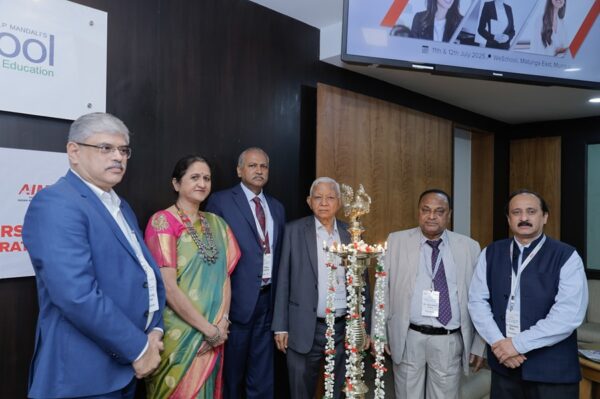
The summit on ‘Women in Leadership for Viksit Bharat’, jointly hosted by WeSchool, the Association of Indian Management Schools (AIMS), and Ratan Tata Maharashtra State Skills University, brought together a cross-section of stakeholders from governance, academia, and industry to discuss a crucial gap in India’s growth story: the underrepresentation of women in leadership roles.
At the heart of the discussion was a paradox: while women constitute 48% of India’s higher education enrollment, only a fraction make it to decision-making roles. For instance, just 9–10% of women reach boardrooms, and a mere 12% occupy leadership positions, despite 41% of the country’s higher education cohort being female. These figures, presented and reiterated throughout the summit, underscore a pressing concern — that India’s demographic dividend is incomplete without addressing its gender leadership gap.
The event positioned itself not just as a ceremonial gathering but as a call to institutional action. Leaders stressed that India’s journey toward becoming a Viksit Bharat (Developed India) by 2047 must be inclusive by design, not by default. That means policy, education, and workplace ecosystems must align to enable women from diverse socio-economic backgrounds to step into leadership roles.
The summit’s sessions explored key barriers — lack of access, socio-cultural constraints, gaps in mentorship, and the invisibilisation of women’s work in both formal and informal economies. There was also a strong focus on the role of skilling and education in building leadership capacity, particularly in sectors like STEM, administration, entrepreneurship, and governance.
Countries like Rwanda, Finland, and New Zealand were frequently referenced as case studies where inclusive leadership models have translated into stronger national outcomes — from better health and education indices to more equitable economies. India, speakers noted, has the talent pool — but it needs structural and cultural shifts to realise its full potential.
Prof. Dr. Uday Salunkhe, Group Director of WeSchool, pointed out: “While India sees 41% women in higher education, only 12% reach leadership roles — a gap we must urgently address. At WeSchool, we see education as a transformative force.”
Dr. Apoorva Palkar, Founding VC of Ratan Tata Maharashtra State Skills University, echoed that sentiment, highlighting that this isn’t just a gender issue — “It’s a missed opportunity for inclusive growth.” If women aren’t present at tables where decisions are made, she argued, “those decisions will never fully represent or benefit society at large.”
Government participation was also robust, with IAS officers including Mrs. Vinita Singhal, Mrs. Radhika Rastogi, and Mrs. Manisha Verma bringing grassroots perspectives on gender-inclusive policy design. Academic leaders like Dr. Ujwala Chakradeo and Dr. Upasna Agrawal discussed institutional reforms to embed leadership training early in educational pathways.
Industry voices such as Ms. Aarti Harbhajanka (Primus Partners), Dr. Tanaya Mishra (In-Solution Global Ltd.), and Ms. Poyni Bhatt (formerly of SINE–IIT Bombay) provided insights into how startup ecosystems and corporate governance structures can either accelerate or inhibit women’s rise to the top.
Throughout the summit, one theme remained constant: India cannot afford to exclude half its population from the leadership narrative. The path to a developed India must be paved with inclusive leadership, and that means reimagining how women access, navigate, and shape systems of power and progress.
The summit concluded with a shared resolve: to turn dialogue into design, and design into durable change. If Viksit Bharat is the destination, women’s leadership is the vehicle that can drive us there — faster, fairer, and stronger.
Education
NCERT Launches New Class 5 & 8 Textbooks, Makes Art Education Mandatory
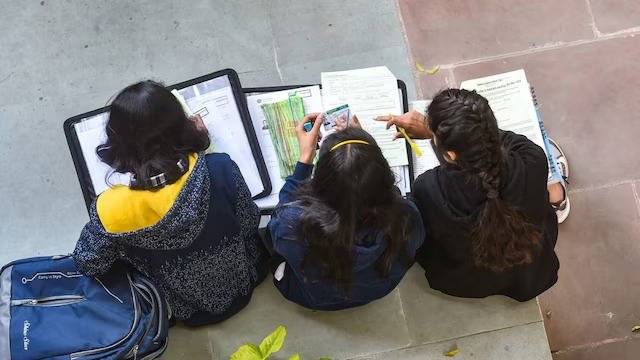
The National Council of Educational Research and Training (NCERT) has launched a new set of textbooks for Classes 5 and 8 for the 2025–26 academic session, designed in accordance with the National Education Policy (NEP) 2020 and the National Curriculum Framework for School Education (NCF-SE) 2023. This marks a significant shift in India’s school education approach, with a renewed focus on creativity, scientific temper, skill development, and values rooted in Indian heritage.
The new Class 8 textbooks include Curiosity (Science), Kaushal Bodh (Vocational Education), Poorvi (English), Malhaar (Hindi), and Kriti (Art Education). For Class 5, the newly introduced books are Santoor (English) and Veena (Hindi). Designed with simple language and rich visuals, these books aim to spark curiosity while enhancing concept clarity.
Among the highlights is Curiosity, the Class 8 science book that covers topics across physics, chemistry, and biology through real-life examples and activity-based modules. It includes dedicated chapters on COVID-19 vaccine development, India’s space missions like Chandrayaan, Ayurveda, and the Make in India initiative—positioning science education within the context of India’s modern achievements.
Kaushal Bodh introduces students to skill-based learning, preparing them for real-world employment and entrepreneurship. Poorvi, the Class 8 English book, presents stories based on the lives of national icons such as Major Somnath Sharma, Verghese Kurien, and physicist Bibha Choudhary to inspire values like courage and innovation.
In a landmark move, art education has been made compulsory. Kriti brings music, drama, and theatre into the mainstream classroom, as recommended by NEP 2020. This initiative aims to nurture creativity across disciplines, allowing children to express themselves beyond textbooks and tests.
For younger learners, the new Class 5 books Santoor and Veena adopt an activity-based learning model that promotes language acquisition through stories, songs, and play—departing from rote methods to make early education more engaging.
Despite enthusiasm from schools and parents, distribution has seen some hurdles. Reports indicate limited stock availability on platforms like Amazon and in local stores. Many parents and educators are urging NCERT to make digital versions of the books available in PDF format. NCERT has acknowledged the demand and plans to print over 15 crore copies to meet nationwide needs. Partnerships with e-commerce platforms are also being explored to streamline delivery.
This new textbook rollout is part of a broader national effort to reimagine the Indian classroom—rooted in local knowledge, focused on real-world skills, and responsive to 21st-century learning needs.
Education
US Embassy Tightens Social Media Checks for Student Visas

The U.S. Embassy in New Delhi has intensified its vetting process for applicants of F, M, and J non-immigrant visas by requiring disclosure of and public access to social media accounts used over the past five years. Under the updated rules, all social media handles—including Facebook, Instagram, Twitter, LinkedIn, TikTok, Reddit, and others—must be listed on the DS‑160 form, and profiles must be set to public during the visa screening process.
Consular officers are explicitly authorised to review candidates’ public posts, comments, and shares—and may even check private messages—to assess “hostility toward the United States” or support for extremist or anti‑U.S. content. Failure to comply, misrepresent information, or omit an account can result in visa denial and bar future visa eligibility.
This update forms part of a broader expansion of screening procedures initiated in June. Diplomatic posts worldwide paused student visa interviews to implement the new protocol, which treats every visa decision as a “national security decision”. The U.S. Embassy in India also recently issued a reminder via X, stating continuous monitoring of visa holders is in effect and violations of U.S. laws—even after visa issuance—can result in revocation and deportation.
These changes reflect the U.S. administration’s emphasis on enhanced national security and combating visa fraud. While some students and immigration advocates have raised concerns about privacy and freedom of expression, the Embassy stresses that visa screening is an ongoing process. Indian students and other applicants are advised to review their online activity and ensure transparency with their DS‑160 submissions.
Education
CBSE Requests Affiliated Schools to Host NIOS Public Exams in October–November 2025
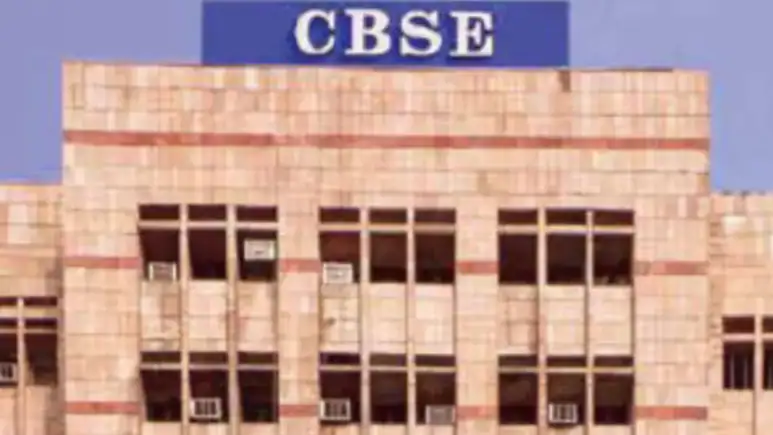
The Central Board of Secondary Education (CBSE) has called on its affiliated schools to assist with the conduct of the National Institute of Open Schooling (NIOS) public examinations scheduled for October–November 2025.
In a recent official communication addressed to principals and heads of schools, CBSE emphasised that NIOS requires infrastructural and logistical support to conduct its biannual board examinations, which include assessments for Class 10, Class 12, and various vocational courses.
“The next Public Examinations of NIOS are scheduled to be held in October–November 2025,” the notice stated, adding that CBSE-affiliated institutions have historically played a key role in enabling NIOS to run its exams smoothly.
Schools willing to extend support have been asked to register their intent on the official NIOS website at https://exams.nios.ac.in under the section: Examination Centre > Register Now.
NIOS operates under the Ministry of Education and is the country’s largest open schooling body. It caters to learners from diverse backgrounds, offering flexibility in learning and examination schedules, especially for students who may be outside the traditional school system.
“Your assistance will help NIOS in holding Public Examinations of its learners,” the CBSE notice concluded, underlining the collaborative nature of this effort.
By participating in this initiative, CBSE schools are not only supporting a national mandate for inclusive education but also contributing to educational equity by helping millions of NIOS learners access fair and organised exam environments.
Education
No More Backbenchers: How a Simple Seating Shift Is Reimagining Learning
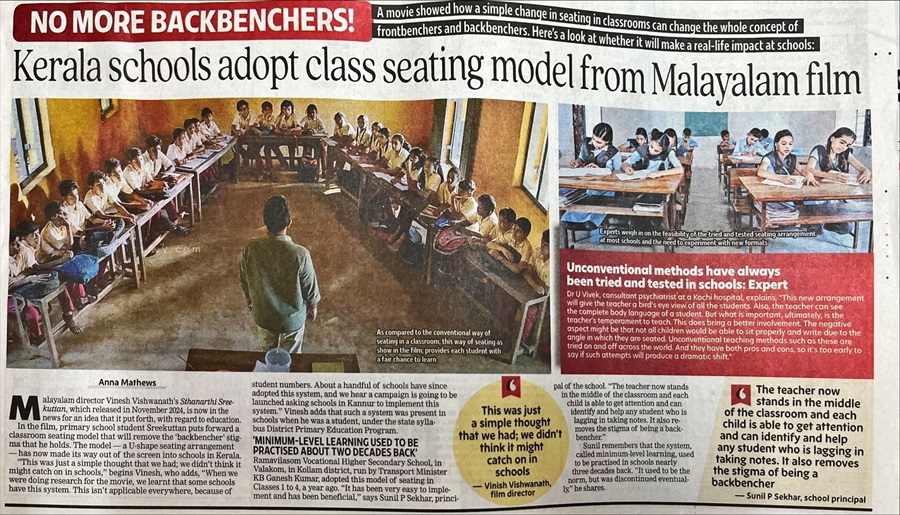
When was the last time you thought about where your students sit? If you think a seat is just a seat — think again.
A simple shift in seating arrangements, sparked by the Malayalam film Sthanarthi Sreekuttan, is inspiring schools in Kerala to break the age-old divide of “frontbenchers” and “backbenchers”. The Times of India recently reported how some schools have begun rethinking how rows of benches shape mindsets — often turning bright learners into passive listeners by default.
Preethi Vickram, Founder of Tapas Progressive Learning, applauded this unique approach online:
The truth is, classroom seating is more than furniture. It’s a mirror of our teaching philosophies. For decades, rigid rows have told students to sit down, face forward, and stay quiet while the teacher talks. One person speaks, everyone else absorbs. But learning doesn’t work in a straight line — it happens in loops, debates, disagreements, and those random questions that make everyone think.
It’s not just an emotional idea — there’s solid science behind it. A 2020 review in Frontiers in Psychology found that classroom layouts directly affect interaction and motivation. The Classroom Direct blog points out that flexible layouts foster collaboration, peer learning, and inclusivity. And a 2022 ESI Conference study noted that traditional seating can create power hierarchies where only frontbenchers thrive.
In India, we know this divide well. Backbenchers are often seen as mischievous or disinterested — but what if they were simply disengaged by design? Many schools still enforce outdated seating rules: girls must sit separately from boys; ‘weak’ students banished to the back; bright ones pushed to the front like prized trophies. But what are we telling children when we make them sit apart based on gender, marks or silence? That some voices matter more than others.
Architects and education designers have long championed a different approach. Rosan Bosch’s designs for Sweden’s Vittra School are modular and playful, showing that space itself can be a teacher. Danish Kurani, an expert in reimagining learning spaces, writes that the biggest mistake schools make is assuming they can modernise teaching methods without changing the physical space: “You can’t have collaborative, project-based learning in a classroom still set up for rows of passive listening.”
Kerala’s small but significant shift is a reminder that big change often starts with small, visible actions. When students sit in circles, clusters, or flexible pods, they are more likely to speak up, listen actively, and learn from one another. It helps break the silent stigma that ‘the back’ means you don’t matter.
Designers like Kurani argue that students should have a voice in how their classrooms look and feel — because when the space reflects curiosity and movement, it encourages the same in young minds. The Studio Schools Trust in the UK, the Reggio Emilia approach in Italy, and Big Picture Learning schools in the US all prove that flexible, student-centred learning environments are not “alternative” anymore — they’re the future.
And this shift doesn’t need fancy gadgets or big budgets. It’s the lowest-cost ‘edtech’ upgrade schools can make: moving a few benches, opening up a circle, creating nooks for quiet work and spaces for loud debate. It tells children: “Your voice matters, wherever you sit.”
In a world that needs more curiosity, connection, and creativity — we cannot afford to let seating stifle learning.
So let’s not just remove the backbenchers — let’s remove the very idea of front and back.
Because when every child feels seen and heard, there are no bad seats in the house.
References: * Classroom Direct Blog, 2021 * Frontiers in Psychology, 2020 * ESI Conference Proceedings, 2022 * Danish Kurani on Common Classroom Design Mistakes
Education
NEP 2020’s Panch Sankalpa to Guide Central Universities: Dharmendra Pradhan
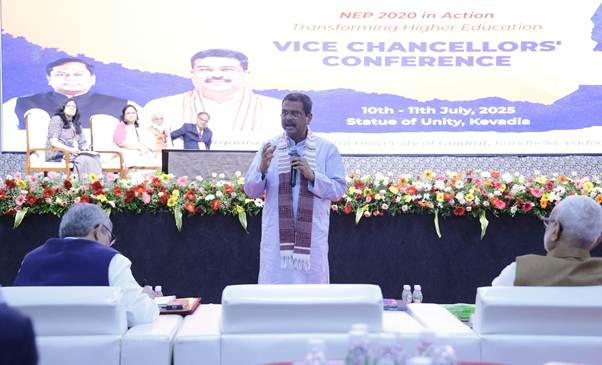
More than 50 Vice Chancellors of India’s central universities gathered in Kevadia, Gujarat for a two-day conference to assess the implementation of the National Education Policy (NEP) 2020 and lay the groundwork for the coming years. Organised by the Ministry of Education in collaboration with the Central University of Gujarat, the conference seeks to align higher education institutions with the broader national vision of Viksit Bharat by 2047.
Union Education Minister Dharmendra Pradhan, addressing the gathering, outlined the Panch Sankalpa of NEP 2020—next-generation education, multidisciplinary learning, innovation, holistic development, and Bharatiya orientation—as the guiding principles for institutional transformation. He emphasised that India’s higher education ecosystem has undergone significant change over the last decade, becoming more flexible, inclusive, and innovation-driven. Student enrolment has increased by 30% since 2014–15 to reach 4.46 crore, with female enrolment growing by 38%. The gross enrolment ratio for female students now exceeds that of males, while enrolment among Scheduled Castes and Scheduled Tribes has also improved. PhD enrolments have nearly doubled, with women registering a 136% increase.
The Minister urged Vice Chancellors to play a transformative role by redesigning curricula, improving digital infrastructure, strengthening faculty training, and promoting multidisciplinary education. He reiterated the goal of raising the gross enrolment ratio in higher education to 50% by 2035, in line with the NEP’s vision. Placing students at the centre of all reform efforts, he called on universities to foster job creators, ethical innovators, and socially responsible graduates.
Pradhan also encouraged institutions to reflect on India’s intellectual heritage while preparing for a global future, invoking the academic “Triveni Sangamam” of celebrating the past, calibrating the present, and creating the future. He recommended that each university prepare a strategy paper to fully implement NEP 2020, incorporating Indian Knowledge Systems, digital skilling initiatives, and campus-led innovations. He proposed that such review conferences be hosted at the campus level to promote decentralised engagement and exchange of ideas.
Dr. Hashmukh Adhia, Chancellor of the Central University of Gujarat, spoke about the six principles of karmayoga and the importance of Indian knowledge systems in shaping individual and collective progress. Dr. Vineet Joshi, Secretary of Higher Education, reflected on the journey since the policy’s launch and reiterated that NEP 2020 imagines universities not as degree-granting institutions, but as ecosystems of innovation, research, and holistic development. Dr. Sunil Barnwal, Additional Secretary, underlined the foundational values of access, equity, quality, affordability, and accountability, and highlighted the importance of stakeholder partnerships in driving reform.
Prof. Rama Shanker Dubey, Vice Chancellor of Central University of Gujarat, reaffirmed that all central universities are committed to advancing the vision of Viksit Bharat through concrete, on-ground measures. The conference, spread over ten thematic sessions, includes discussions on the Four-Year Undergraduate Programme, digital tools like SWAYAM and AAPAR, university governance through SAMARTH, alignment of education with the future of work, and research and innovation frameworks such as ANRF and PMRF. Other themes include equity, internationalisation, faculty development, and the integration of Indian languages and knowledge systems.
Participating universities include Jawaharlal Nehru University, University of Delhi, Tripura University, Central University of Rajasthan, Sikkim University, and many others. The outcomes of the conference are expected to help define the next phase of NEP 2020 implementation, enabling institutions to become more responsive, inclusive, and globally competitive.
Education
Less Than Half of Indian Schools Offer Skill-Based Courses for Senior Students: NCERT Survey
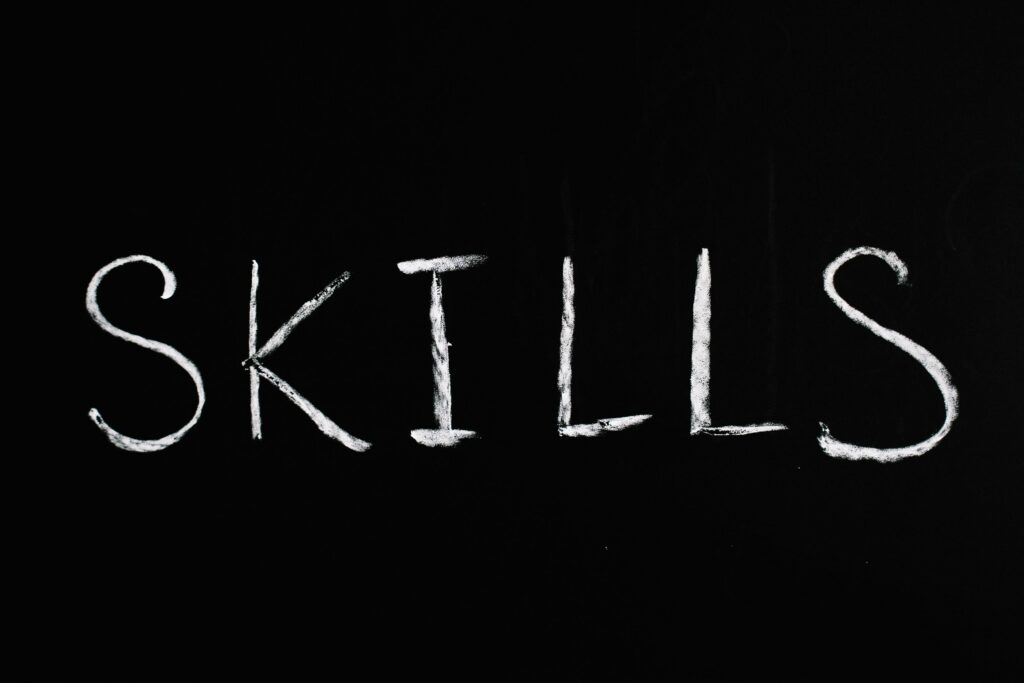
A recent survey conducted by NCERT’s National Assessment Centre has revealed that only 47% of schools across India currently offer any skill-based courses to students in Class 9 and above. This statistic highlights a significant gap in the availability of practical, job-ready education at the secondary level—an area that India’s New Education Policy has been aiming to strengthen.
The survey also found that student enrolment in these courses is even lower. Just 29% of students in Classes 9 and above have opted for skill-based subjects, indicating the need for better awareness, guidance, and integration of these programmes into mainstream learning.
The courses that are being offered include trending and industry-relevant subjects like Artificial Intelligence, Data Analytics, Digital Marketing, and E-commerce. However, experts believe these numbers are far from adequate in a country with one of the world’s largest youth populations.
At the higher education level, there is a stronger push for integrating skills into curricula. Many skill universities now structure their programmes with a 60% to 70% skill-based component, offering students a blend of theoretical and practical knowledge designed to make them workforce-ready.
The NCERT report recommends that more schools must be brought into the fold of skill education. With the job market rapidly evolving and the demand for digital and emerging technology skills growing, strengthening school-level skill education can bridge the gap between academic learning and real-world employability.
Building robust vocational streams in schools could also help address the challenge of students dropping out after secondary education due to a lack of clear pathways into meaningful careers.
-

 Education2 months ago
Education2 months agoCBSE’s ‘Sugar Boards’ Initiative: Tackling the Sweet Crisis in Indian Schools
-
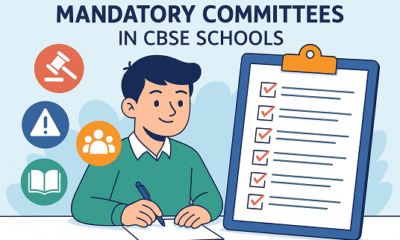
 Education3 months ago
Education3 months agoIs Your School Following These Mandatory CBSE Committees?
-
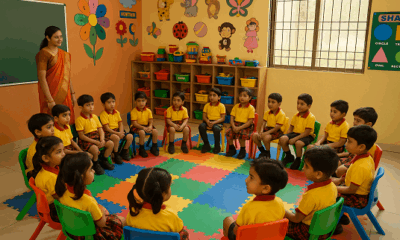
 Education3 months ago
Education3 months agoMaharashtra to Regulate Pre-Primary Education with New Law Aligned to NEP 2020
-
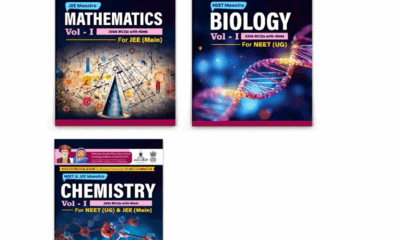
 Education3 months ago
Education3 months agoMAHAJYOTI’s Book Distribution Scheme to Empower 7,000 OBC Students Preparing for JEE/NEET & MHT-CET
-
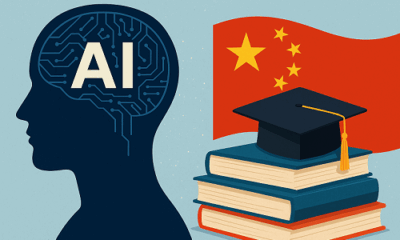
 Education3 months ago
Education3 months agoChina Embarks on Ambitious AI-Driven Education Reform to Build a ‘Strong Education Nation’ by 2035
-
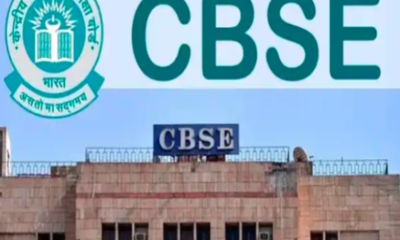
 Education3 months ago
Education3 months agoCBSE Introduces Mandatory Bridge Course for Classes 6 to 12 in Chhattisgarh Under NEP 2020
-
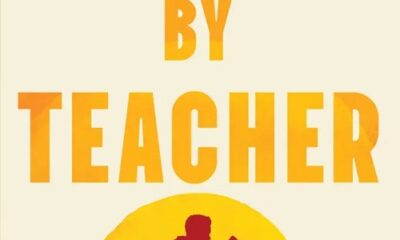
 Education2 months ago
Education2 months agoJohn King’s Book ‘Teacher By Teacher’: A Global Tribute to the Transformative Power of Education
-
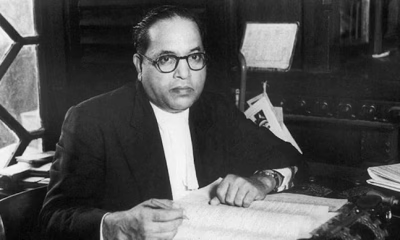
 Education3 months ago
Education3 months agoRewriting Ambedkar: Why Students Must Know the Man Beyond the Constitution
-
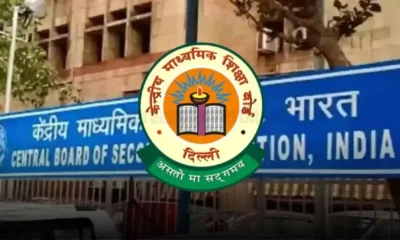
 Education3 months ago
Education3 months agoCBSE Mandates 50-Hour Annual Training for Teachers, Declares STEM as 2025 Theme
-
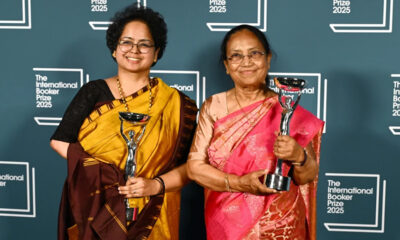
 Education2 months ago
Education2 months agoBanu Mushtaq’s International Booker Win Is a Wake-Up Call for Indian Schools to Reclaim Literature



